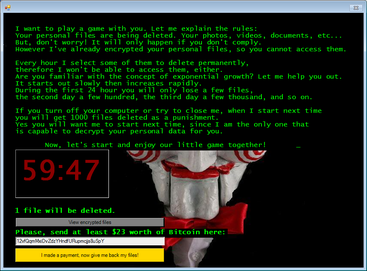Pennsylvania county shells out a $500K ransom to recover stolen data
Delaware County says election data remains securely tucked way on a separate network


Last week, hackers stole data from Delaware County, Pennsylvania and asked for a $500,000 ransom. New reports claim the county has buckled and will use its insurance coverage to pay the fee and restore the data.
The cyber attack led to the county taking parts of its network offline when it discovered the compromise.
"The County of Delaware recently discovered a disruption to portions of its computer network. We commenced an immediate investigation that included taking certain systems offline and working with computer forensic specialists to determine the nature and scope of the event. We are working diligently to restore the functionality of our systems," said the county.
The county added that the Bureau of Elections and the County's Emergency Services Department were not impacted and were on separate computer networks from The County of Delaware.
“There is no evidence they were impacted by the disruption,” it added. “The County is working to resolve this issue as quickly as possible and will provide updates when they are available. Thank you for your patience as we work to restore the functionality of our systems.”
It is thought that the IP address for the Delaware County attack is tied to the Netherlands, but the attack could have originated elsewhere.
Chad Anderson, senior security researcher at DomainTools, told IT Pro that ransomware authors have increasingly gone after the double extortion attacks for the simple reason that this further encourages their victims to pay.
Get the ITPro daily newsletter
Sign up today and you will receive a free copy of our Future Focus 2025 report - the leading guidance on AI, cybersecurity and other IT challenges as per 700+ senior executives
“When sitting on a treasure trove of sensitive personal information, attackers know that the looming threat of exposing it on hacking forums gives them more leverage to instigate a payment. This all comes of course with an increasing number of businesses paying, further incentivizing attackers to use this extra leverage,” he said.
Anderson added that governmental bodies and public entities are particularly attractive targets for cyber-crime gangs and nation-state actors because of the financially lucrative or politically sensitive information they hold.
“Government minsters, civil servants and anyone else involved in the process of government need to be especially vigilant to phishing emails – which remain the most popular entry vector for ransomware - and the security measures in place need to be the most stringent available, including user training on the risks and tell-tale signs of a phishing attack and email filtration systems,” said Anderson.
Rene Millman is a freelance writer and broadcaster who covers cybersecurity, AI, IoT, and the cloud. He also works as a contributing analyst at GigaOm and has previously worked as an analyst for Gartner covering the infrastructure market. He has made numerous television appearances to give his views and expertise on technology trends and companies that affect and shape our lives. You can follow Rene Millman on Twitter.
-
 Bigger salaries, more burnout: Is the CISO role in crisis?
Bigger salaries, more burnout: Is the CISO role in crisis?In-depth CISOs are more stressed than ever before – but why is this and what can be done?
By Kate O'Flaherty Published
-
 Cheap cyber crime kits can be bought on the dark web for less than $25
Cheap cyber crime kits can be bought on the dark web for less than $25News Research from NordVPN shows phishing kits are now widely available on the dark web and via messaging apps like Telegram, and are often selling for less than $25.
By Emma Woollacott Published
-
 ‘Phishing kits are a force multiplier': Cheap cyber crime kits can be bought on the dark web for less than $25 – and experts warn it’s lowering the barrier of entry for amateur hackers
‘Phishing kits are a force multiplier': Cheap cyber crime kits can be bought on the dark web for less than $25 – and experts warn it’s lowering the barrier of entry for amateur hackersNews Research from NordVPN shows phishing kits are now widely available on the dark web and via messaging apps like Telegram, and are often selling for less than $25.
By Emma Woollacott Published
-
 Healthcare systems are rife with exploits — and ransomware gangs have noticed
Healthcare systems are rife with exploits — and ransomware gangs have noticedNews Nearly nine-in-ten healthcare organizations have medical devices that are vulnerable to exploits, and ransomware groups are taking notice.
By Nicole Kobie Published
-
 Alleged LockBit developer extradited to the US
Alleged LockBit developer extradited to the USNews A Russian-Israeli man has been extradited to the US amid accusations of being a key LockBit ransomware developer.
By Emma Woollacott Published
-
 February was the worst month on record for ransomware attacks – and one threat group had a field day
February was the worst month on record for ransomware attacks – and one threat group had a field dayNews February 2025 was the worst month on record for the number of ransomware attacks, according to new research from Bitdefender.
By Emma Woollacott Published
-
 CISA issues warning over Medusa ransomware after 300 victims from critical sectors impacted
CISA issues warning over Medusa ransomware after 300 victims from critical sectors impactedNews The Medusa ransomware as a Service operation compromised twice as many organizations at the start of 2025 compared to 2024
By Solomon Klappholz Published
-
 The UK cybersecurity sector is worth over £13 billion, but experts say there’s huge untapped potential if it can overcome these hurdles
The UK cybersecurity sector is worth over £13 billion, but experts say there’s huge untapped potential if it can overcome these hurdlesAnalysis A new report released by the DSIT revealed the UK’s cybersecurity sector generated £13.2 billion over the last year
By Solomon Klappholz Published
-
 Warning issued over prolific 'Ghost' ransomware group
Warning issued over prolific 'Ghost' ransomware groupNews The Ghost ransomware group is known to act fast and exploit vulnerabilities in public-facing appliances
By Solomon Klappholz Published
-
 The Zservers takedown is another big win for law enforcement
The Zservers takedown is another big win for law enforcementNews LockBit has been dealt another blow by law enforcement after Dutch police took 127 of its servers offline
By Solomon Klappholz Published